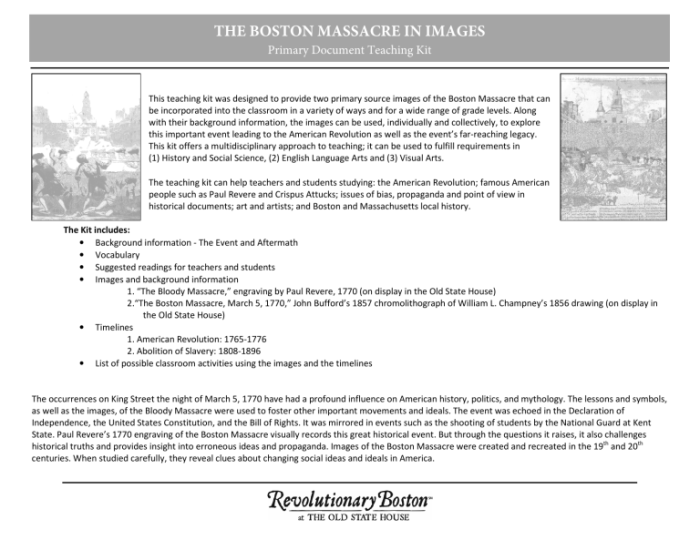Analyzing the boston massacre worksheet answer key – Embark on an academic journey with our comprehensive analysis of the Boston Massacre Worksheet Answer Key, meticulously crafted to illuminate this pivotal event in American history.
Delve into the historical context, eyewitness accounts, legal proceedings, and enduring legacy of this transformative moment, gaining a profound understanding of its impact on the American Revolution.
1. Contextual Background
The Boston Massacre was a pivotal event in American history that occurred on March 5, 1770. It marked a turning point in the relationship between Great Britain and its colonies in North America.
The massacre was the result of escalating tensions between the British soldiers stationed in Boston and the local colonists. The presence of British troops in the city had become increasingly resented by the colonists, who viewed them as a symbol of oppression and taxation.
Social and Political Tensions
- Growing resentment of British authority
- Economic hardship and inflation
- Imposition of taxes without colonial representation
- British troops quartered in Boston
- Competition for jobs and resources
2. Analyzing the Events
Sequence of Events
- A mob of colonists began harassing British soldiers
- The soldiers fired into the crowd, killing five colonists
- The incident sparked outrage and protests
- The British soldiers were arrested and tried
Perspectives of the British Soldiers
- Claimed to have fired in self-defense
- Felt threatened by the hostile crowd
- Followed orders from their commanding officer
Perspectives of the Colonists
- Accused the soldiers of murder
- Believed the soldiers had provoked the crowd
- Demanded justice for the victims
Key Factors Contributing to Violence
- Tensions between colonists and British soldiers
- Misunderstandings and lack of communication
- Presence of weapons and alcohol
- Failure of British authorities to control the situation
3. Eyewitness Accounts: Analyzing The Boston Massacre Worksheet Answer Key
Different Viewpoints
- Accounts from British soldiers and colonists
- Varying descriptions of the events
- Contradictory claims about who fired first
Reliability and Biases, Analyzing the boston massacre worksheet answer key
- Eyewitness accounts can be unreliable
- Witnesses may have been biased or influenced by their own perspectives
- Historians must carefully evaluate and compare different accounts
4. Legal Proceedings
Charges Against the Soldiers
- Murder
- Manslaughter
Outcome of the Trial
- Six soldiers were found guilty of manslaughter
- Two were branded on their thumbs
- The remaining four were sentenced to death but later pardoned
Impact on Public Opinion
- Increased sympathy for the colonists
- Furthered resentment against British rule
- Contributed to the growing movement for independence
5. Historical Significance

Role in Growing Tensions
- Exacerbated tensions between Britain and the colonies
- Led to calls for greater colonial autonomy
- Influenced the development of revolutionary ideas
Impact on the American Revolution
- Served as a rallying point for colonists
- Increased support for the cause of independence
- Inspired propaganda and literature that fueled the revolution
Question & Answer Hub
What factors contributed to the escalation of violence during the Boston Massacre?
A combination of social tensions, political unrest, and a series of provocations from both British soldiers and colonists led to the escalation of violence.
How did the legal proceedings following the massacre impact public opinion?
The trial of the British soldiers generated significant public debate, with some supporting the soldiers’ actions while others condemned them as excessive force.
What was the historical significance of the Boston Massacre?
The Boston Massacre played a crucial role in escalating tensions between Britain and the colonies, contributing to the growing movement for American independence.